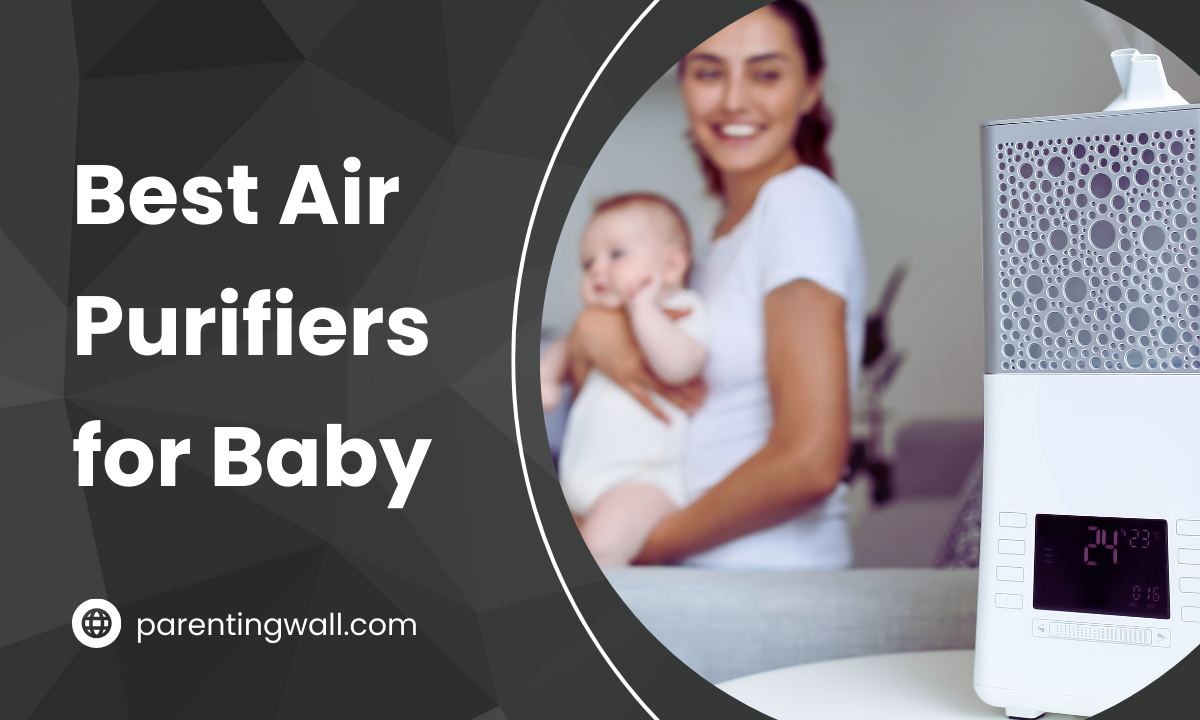Your baby’s birth is a lovely moment, but taking complete care with safety and health aspects is essential too. Clean air is vital to your baby’s well-being. The specialists have selected the best air purifier for baby, and we have created this guide to showcase their features.
When choosing an air purifier for your baby’s nursery, consider noise, coverage, energy economy, UV-C light technology, and intelligent sensors. We will investigate every aspect and provide detailed information to help you decide.
We will also discuss “Humidifier vs. Air Purifier for Baby?” Compare the two and pick the best one for your baby. You can explore the features, benefits, and drawbacks of the top air filters. So, discover the right air filter size and usage for your baby’s room.
Safety is essential so we will discuss rules and line management. Get answers to frequently asked questions and a final summary to give your baby the cleanest air to enable a better start to their life.
Quick View
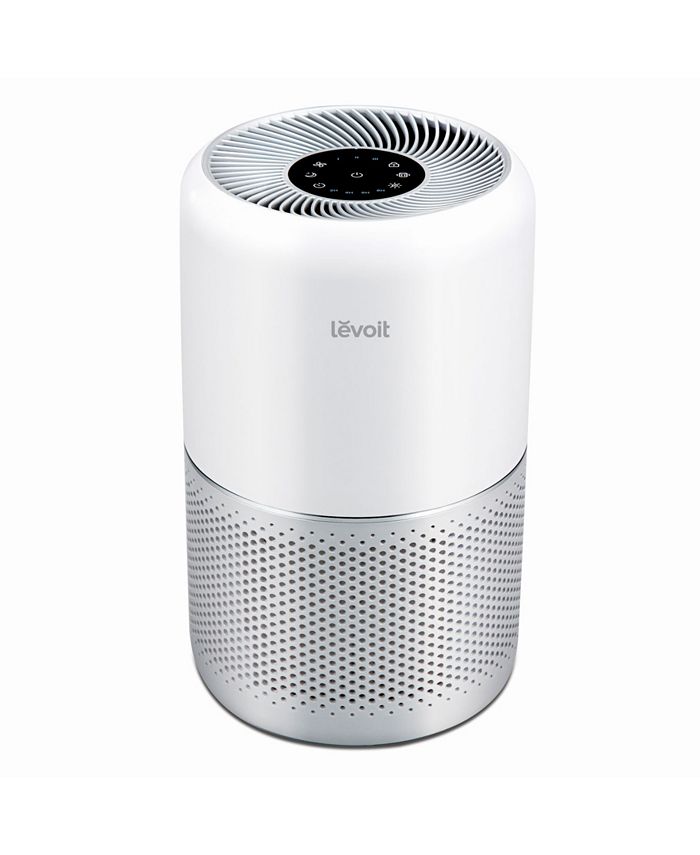
LEVOIT Air Purifier
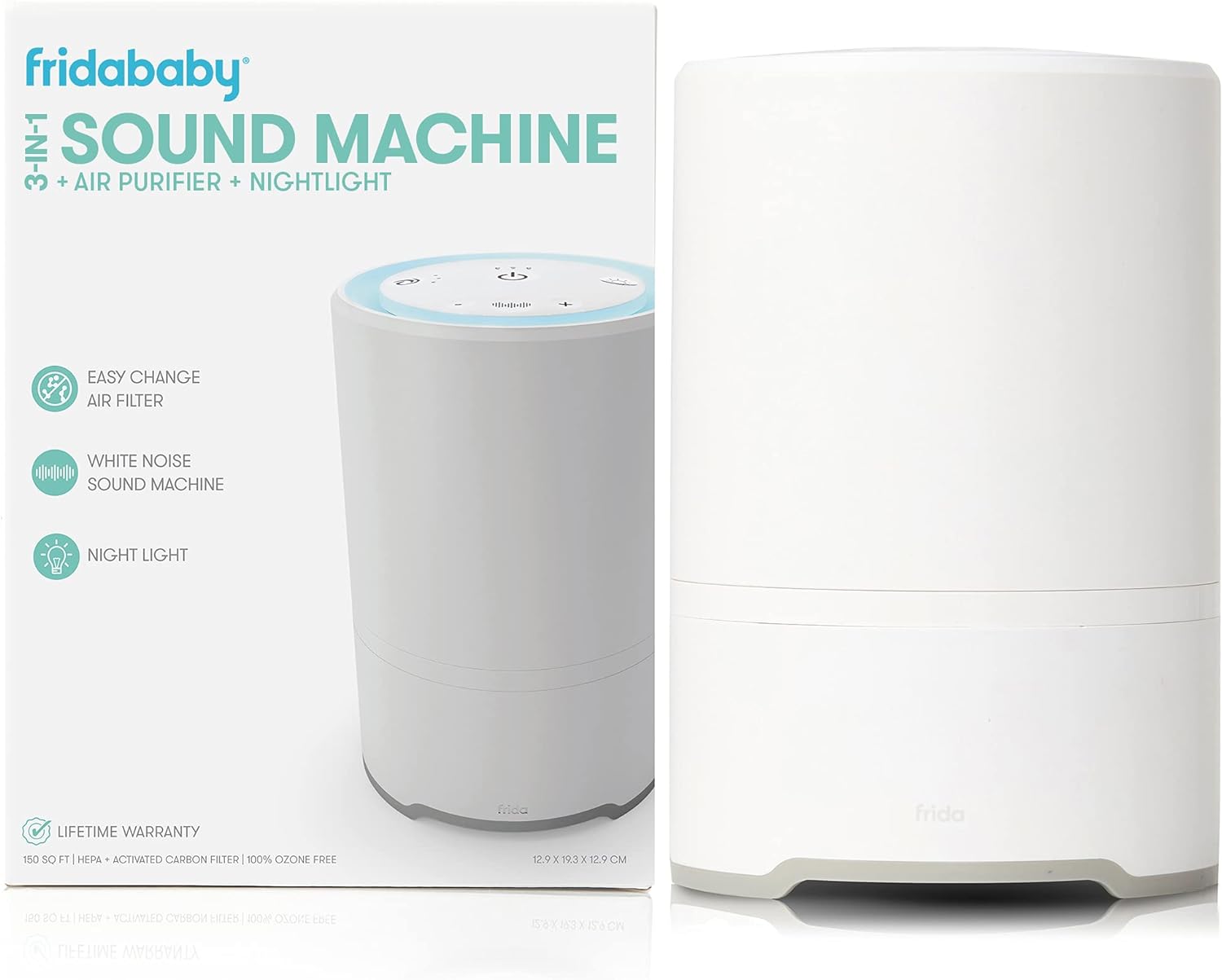
Frida Baby 3-in-1 Sound Machine
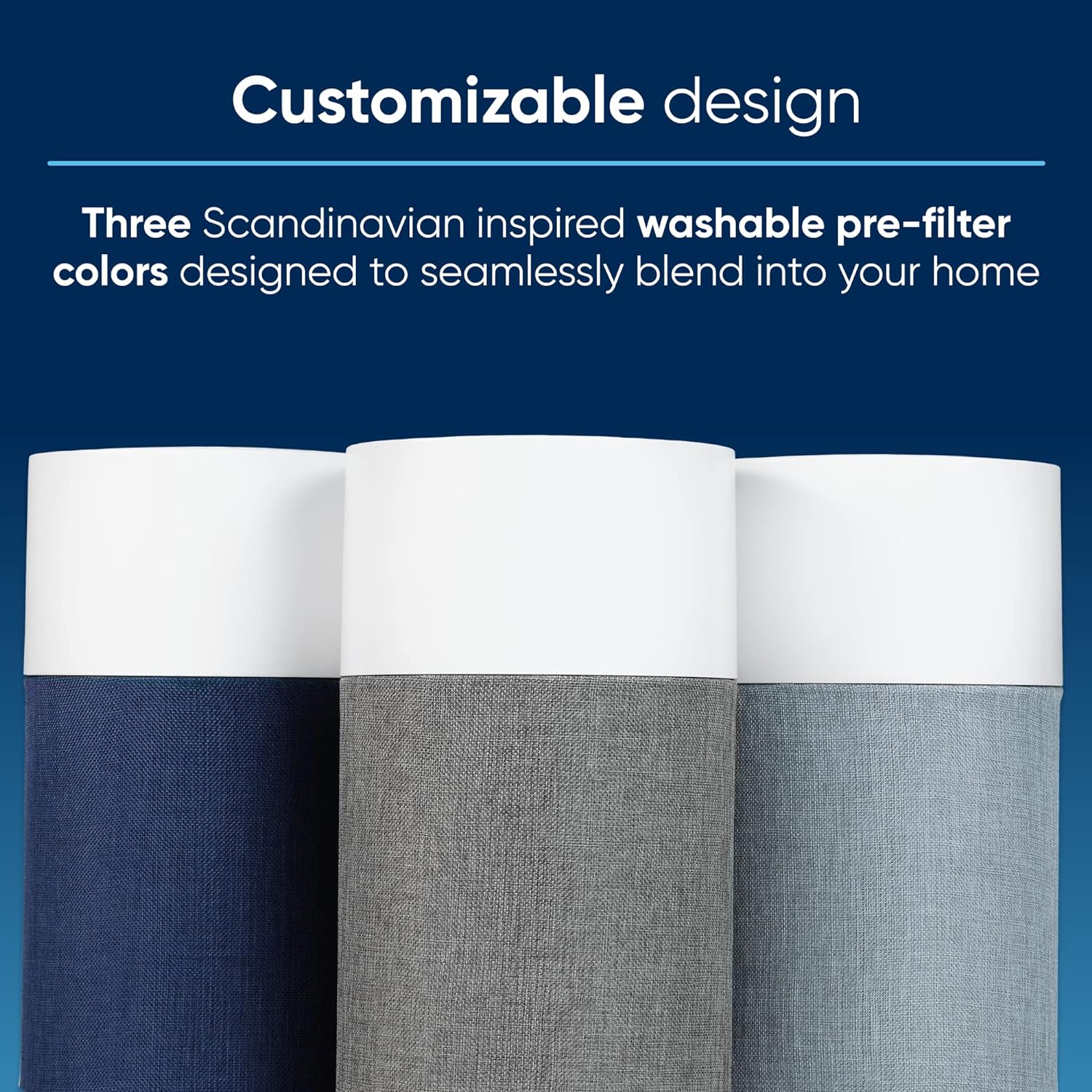
BLUEAIR Baby Air Purifier
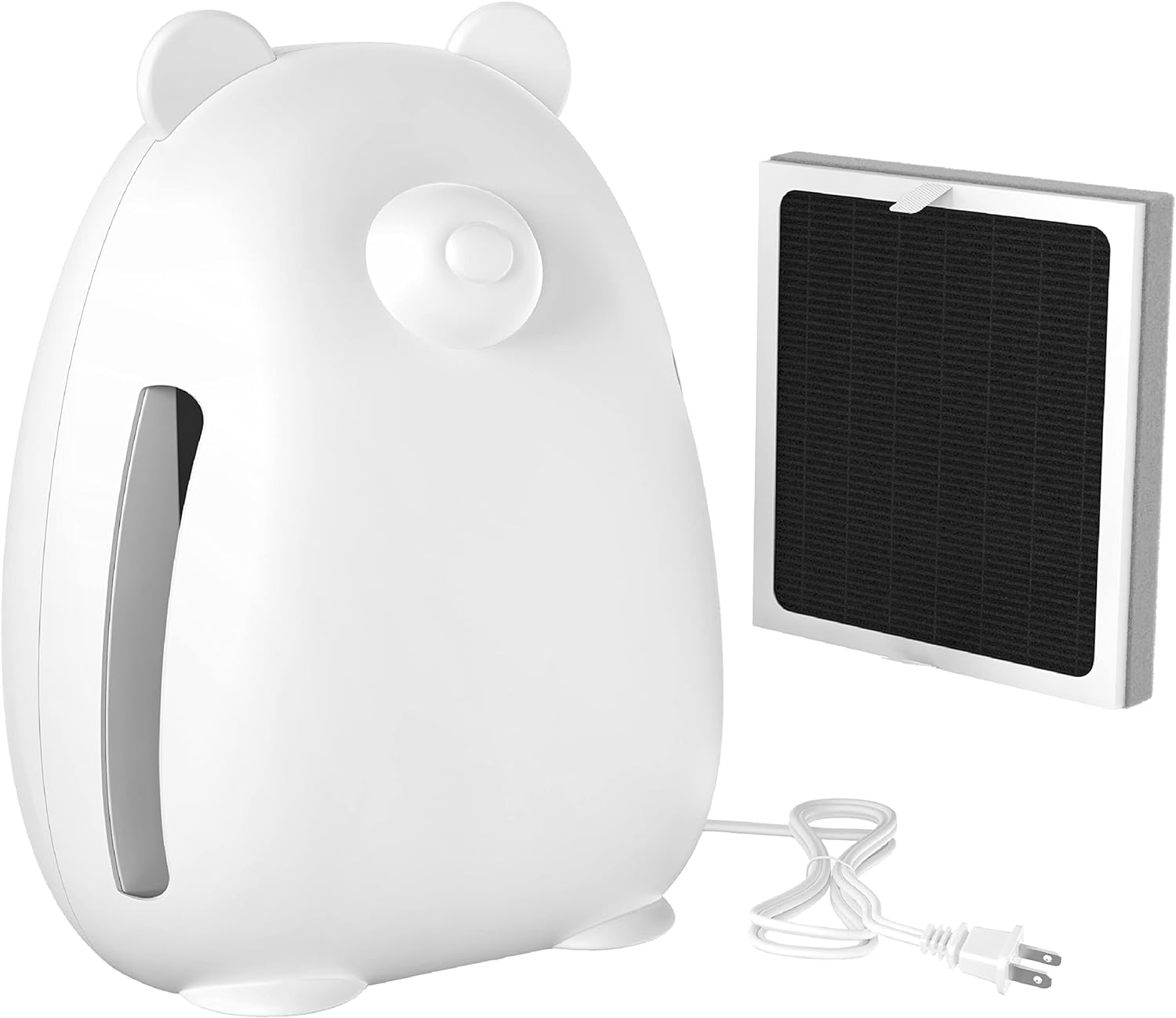
Pure Enrichment Baby Air Purifier
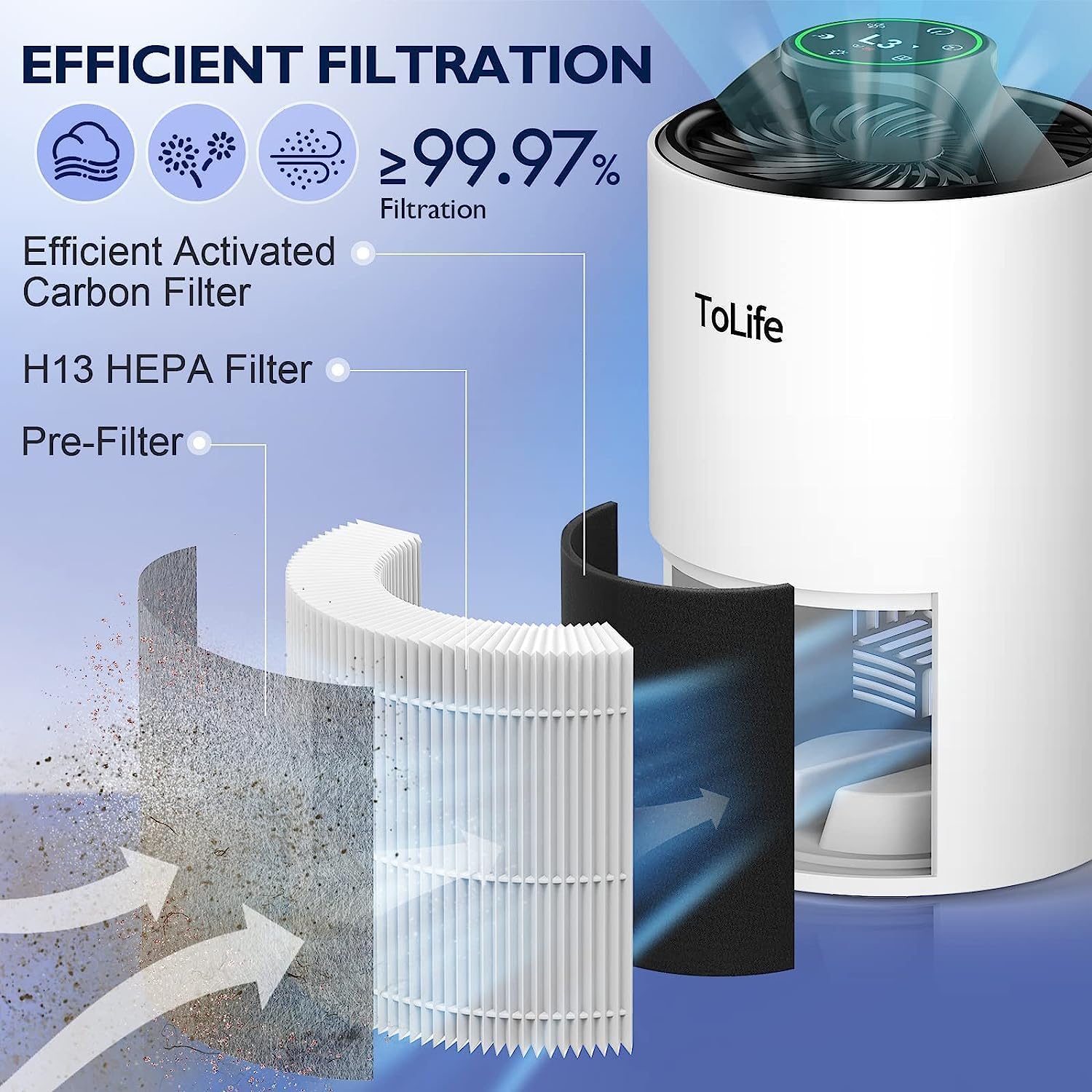
Tolife Baby Air Purifiers
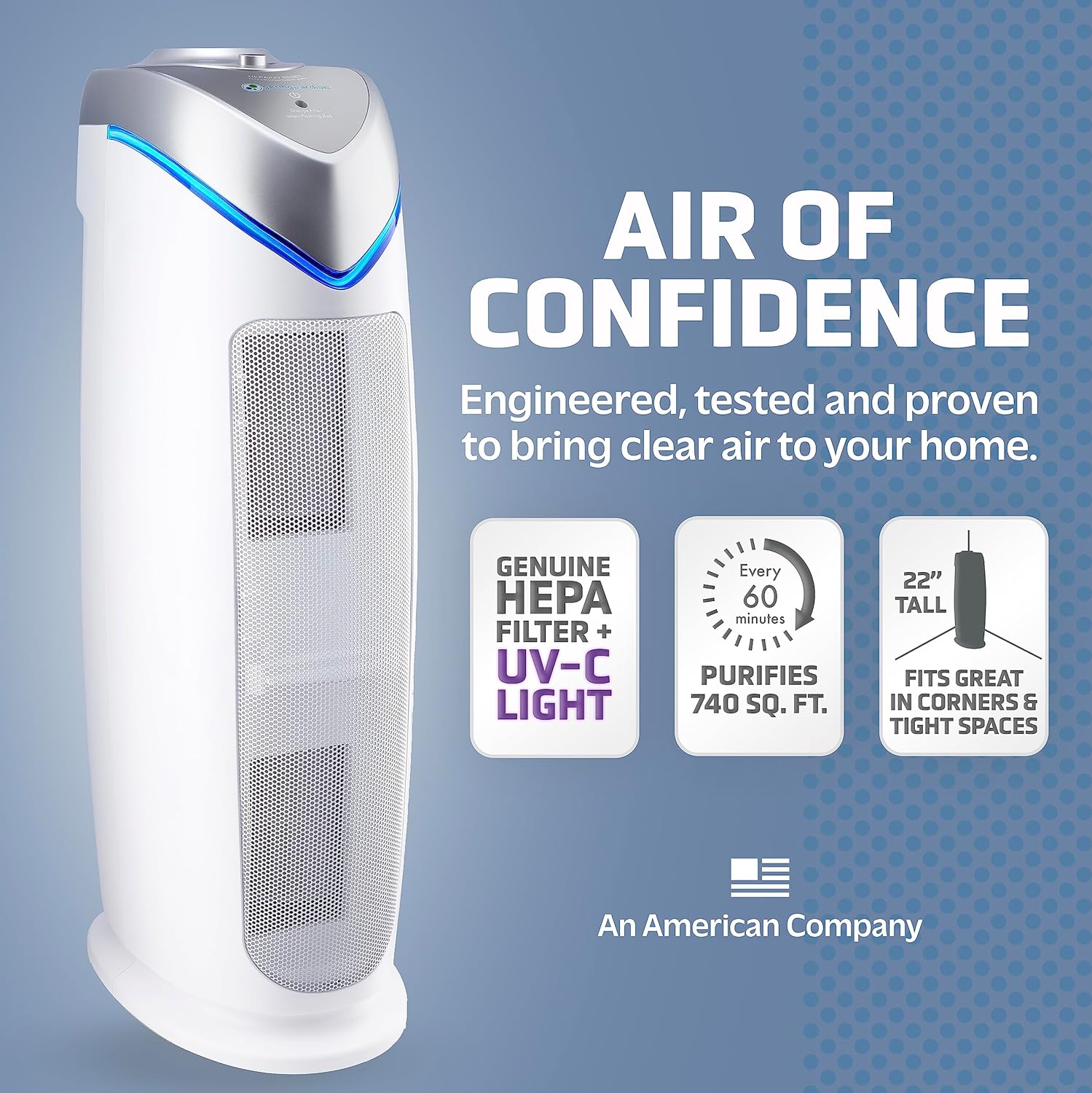
GermGuardian Air Purifier
Factors to consider when choosing an air purifier for a baby
Choosing the right air filter is vital to your baby’s health. Room air quality is essential since pollution and allergens make infants sicker. Consider these factors when purchasing an air filter for your baby’s room:
1. HEPA filtration system for removing allergens and pollutants
The filtration system is crucial when choosing a baby air cleaner. Choose a HEPA-filtered air cleaner. HEPA screens capture dust mites, pollen, and pet dander at 0.3 microns. Clean, allergen-free air is vital to your baby’s health and happiness.
2. Noise level and sleep-friendly features
Babies need a tranquil area to sleep, rest, and grow. Consider how noisy an air filter is and whether it has sleep-inducing characteristics. Air filters with quiet modes are best to use. As long as your infant sleeps well, some versions have noise-cancelling technology.
3. Size and coverage area suitable for the baby’s room
The air filter should fit your baby’s room size and covering area. Buy a room air purifier. Air purifiers clean air per minute using their Clean Air Delivery Rate (CADR). The CADR should match the room size for optimal performance.
4. Energy efficiency and cost-effectiveness
Air purifiers run for an extended period; therefore, energy efficiency is crucial. Shop for models with Energy Star labels or other energy-saving features.
The original cost of the cleaner is significant, but you should also consider its long-term operating costs, including filter replacement. A low-energy, low-cost air filter may clean your baby’s air without breaking the bank.
5. UV-C light technology for killing germs and bacteria
UV-C air purifiers protect kids better. UV-C kills viruses and germs. This feature can aid when the virus spreads, or your baby is sick. Still, the UV-C light must be safely inside the filter to prevent direct contact.
6. Smart sensors and air quality indicators for real-time monitoring
A sophisticated air purifier for babies with sensors and air quality signals lets you check the room’s air quality anytime.
These sensors can detect air quality changes and adjust air filter settings. Look for versions with air quality indicators so you can act fast. This sophisticated technology simplifies and ensures clean air for your infant.
Humidifier vs Air Purifier for Baby? What to Choose?
Mothers want healthy babies. Sleeping air quality affects your baby’s health and happiness. Humidifiers and air filters increase air quality. Use this guide to compare air cleaners and humidifiers and choose the best one for your baby.
Humidifier for Baby
To avoid drying, humidifiers use wet air. Drying air causes sore throats, chapped lips, and breathing issues. Your baby’s fragile skin and lungs need dampness. Your child will be more comfortable with a humidifier to combat dry air.
Why do newborns benefit from humidifiers?
Babies benefit from humidifiers, especially in dry climates or winter. They can relieve stuffy noses and dry skin and improve sleep. Babies have more breathing issues than adults. A humidifier moistens airways, improving lung health.
Air Purifier for Baby
Humidifiers add moisture, and air filters remove harmful pollutants. Air purifiers clean baby’s air of dust, pollen, pet dander, and contaminants. Families with pets or air pollution may benefit from an air purifier.
Health Benefits of Air Purifiers for Babies
Baby’s room air is cleaner and safer with air filters. They may aid your youngster with allergies or breathing. Purifiers minimize respiratory issues and allergic reactions by removing allergens and contaminants. HEPA-filtered air cleaners catch small particles that could harm your baby.
Choosing the Best for Your Child
Your baby’s needs and home air quality will determine which humidifier or air filter to use. A humidifier can assist in maintaining humidity in dry areas or cold winters. If you have allergies or pollutants, an air purifier may help.
6 Best Air Purifier for Baby
Here is a discussion about the best air purifier for baby:
1. LEVOIT Air Purifier
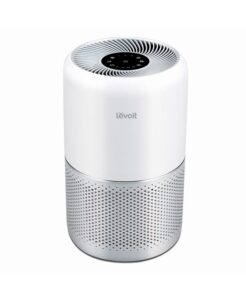
The LEVOIT Core 300-P (Model No.: Core 300) air purifier cleans air effectively. It weighs 7.48 lbs and is 8.7″ x 8.7″ x 14.2″. The 45W motor is powerful and long-lasting. The device has 141 CFM CADR and can clean 1095 square feet with its built-in filter. Premium HEPA filters eliminate 99.97% of ultrafine particles like pollen and animal hair. The 2020 Red Dot-winning unit’s sleek design complements any home.
Features:
- Toxin Absorber, Smoke Remover, and Pet Allergy filters are available.
- Sleep mode makes this air cleaner whisper-quiet at 24 dB.
- The timer, filter lifetime indication, and display light are adjustable.
- The Energy Star, CARB, FCC, and ETL certifications make it safe.
Reason to Choose:
The Core 300-P boasts effective air purification, a streamlined design, and many filters. You can use it safely in whisper-quiet mode. It is ideal for homes that demand clean, quiet air.
Possible Issues:
Use official LEVOIT filters for optimal performance. Other brands of filters may damage the air cleaner. Varied people have varied tastes. Thus, air quality concerns may need trying different filters.
2. Frida Baby 3-in-1 Sound Machine, Air Purifier + Nightlight
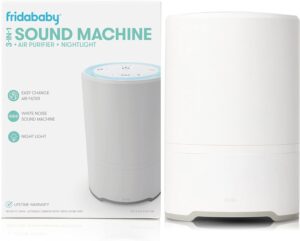
The Frida Baby 3-in-1 Sound Machine, Air Purifier, and Nightlight help kids sleep. This best air purifier for baby has white noise, HEPA air filtration, adjustable fan settings, and a color nightlight.
Features:
- Choose from two white noise options to aid sleep.
- The HEPA filter removes smoke, Odors, and contaminants from the air.
- HEPA filters last 90 days and are easy to change.
- An auto-off timer and three fan speeds let you choose your comfort.
- Choose one of four colors to quiet your bedroom before bed.
- The package includes a sound machine, HEPA filter, and handbook.
Reason to Choose:
For parents seeking a total sleep solution, the Frida Baby 3-in-1 is ideal. Several functions in one unit simplify bedtime. Its white noise, air cleansing, and changeable nightlight hues make it versatile.
Possible Issues:
Users may not like changing the HEPA filter every 90 days and prefer additional white noise options to personalize the sound.
3. BLUEAIR Baby Air Purifier
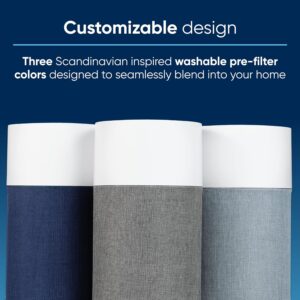
Using HEPA Silent technology, the BLUEAIR Baby Air Purifier can clean 432 sqft in 30 minutes or 180 sqft in 12.5 minutes. This best air purifier for baby quiet enough for bedrooms, nurseries, and home offices at 24 dB low and 49 dB high.
HEPASilent’s dual filter technology may catch viruses and bacteria as small as 0.1 microns. Choose from three washable pre-filter colors to customize your air cleaner. They include the Arctic Trail dark grey pre-filter.
Features:
- This Energy Star-certified Most Efficient device uses less electricity than a light bulb.
- Because it is compact, it fits in your house.
- With 4.8 ACH, the air filter cleans air rapidly and effectively.
- The kit includes a clean pre-filter and an installed filter for easy setup.
- The BLUEAIR Replacement Filter B08KPFWBGM optimizes the system.
Reason to Choose:
We recommend the BLUEAIR Baby Air Purifier because it is quiet, energy-efficient, and customizable. The best air purifier also removes airborne particles with HEPASilent dual filtration.
Possible Issues:
Please verify that this product works with North American 110V–120V. The price may initially seem costly, but the long-term benefits and speed make it worth it.
4. Pure Enrichment Baby Air Purifier
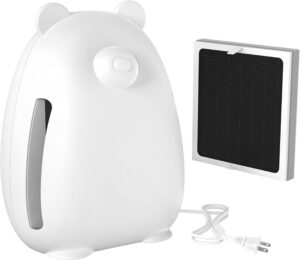
The Pure Enrichment Baby Air Purifier cleans 263 square feet of air in 30 minutes or less. Independent testing shows that its 4-stage filtration system removes 99.97% of dust, allergens, and up to 99.7% of viruses and germs such as Staphylococcus aureus, E. coli, Aspergillus, and H1N1.
There is an Activated Carbon Pre-Filter, a True HEPA Filter, a Coating to make the filter last longer, and an extra UV-C light to improve the cleaning.
Features:
- The kid-friendly, fun, bear-themed design can grow with your child and is great for nurseries, bedrooms, and playrooms.
- You can add the Colour Choice Technology with 7+ soft glow lights as an optional night light.
- There is a child safety lock, three fan speeds, an automatic timer, and a sleep mode for added safety.
- Products with EPA electricity STAR certification use less electricity.
- This best air purifier comes with a 5-year warranty and friendly customer service.
Reason to Choose:
The PureBaby Air Purifier is perfect for parents who want to clean their child’s room air safely and healthily. It uses little energy, including customizable night lighting and safety measures for kids.
Possible Issues:
It works for areas up to 263 square feet, so there might be better choices for bigger rooms. Some people may choose not to use the UV-C light that is available.
5. Tolife Baby Air Purifiers
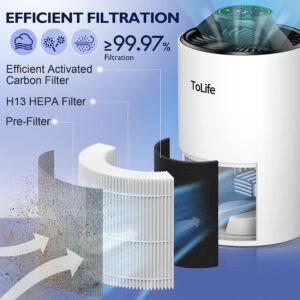
The genuine HEPA filter in ToLife Baby air purifiers collects 99.97% of pollutants, making them effective. Up to five times an hour, the 360° exit design removes smoke, odors, dander, hair, and other particles to improve indoor air quality. The revolutionary 360-degree air intake technology ensures fresh air in spaces up to 215 square feet, making it ideal for home life.
Features:
- The air filter features a low decibel level and a night setting that quiets the fan while you sleep.
- Its aromatherapy capsule lets you add essential oils to perfume the room.
- The best air purifier has a red caution light that indicates filter replacement every 3–6 months and 2000 hours. This optimizes machine performance.
Reason to Choose:
ToLife is unique since it filters well, covers a large room, runs softly, and enables you to adjust aromatherapy. A complete solution for a healthy indoor air environment, it prioritizes physical and mental wellness.
Possible Issues:
The aromatherapy cartridge or filter reminder system may malfunction. Varied folks have varied smell strength preferences. For optimal performance, change the filter regularly.
6. GermGuardian Air Purifier
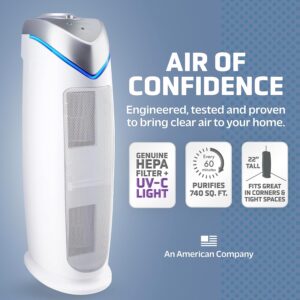
The high-performance GermGuardian Air Purifier cleans and circulates air in rooms up to 743 square feet. Genuine HEPA filters capture 99.97% of germs, dust, pollen, pet dander, and mold spores at 0.1 microns, ensuring clean air.
The inclusion of UV-C light technology targets VOCs and reduces airborne viruses. The HEPA filter lasts longer and works better since the pre-filter captures larger particles.
Features:
- UV-C light technology, True HEPA filtration, and activated charcoal filters kill this air cleaner’s bacteria, allergies, and Odors.
- The world benefits from certified zero ozone emissions.
- Additionally, it works quietly, making it an excellent sleeping spot.
Reason to Choose:
The GermGuardian Air Purifier kills many germs, making it ideal for air cleansing. An activated charcoal filter, UV-C light technology, and genuine HEPA filtration make it a complete indoor air purifier. The acceptance of zero ozone makes it more popular and promotes environmental consciousness.
Possible Issues:
The GermGuardian Air Purifier cleans the air well. However, filter replacement prices may worry users. Some may want a brighter unit for better tracking and control.
Which air purifier size is best for the new baby room?
Your baby’s room needs the right-sized air filter to stay healthy and cozy. Three key considerations can help you choose:
- Measure the Room Size: Determine the baby’s room size. Measure your square feet to determine your air filter needs. Match the room size to the air purifier’s equitable foot coverage for optimal air purification. Thus, the unit can thoroughly clean the room’s air.
- Consider Air Changes Per Hour (ACH): Your air filter’s performance depends on how many air changes per hour it makes. ACH is the number of times the air cleaner can clean a room each hour. For optimal air quality in a baby’s room, strive for four to six ACH. This prevents allergies, pollutants, and airborne particles from entering, making the room baby-friendly.
- Assess Specific Needs: Consider your air quality preferences for the baby’s room. If pet hair or pollen are present, choose a HEPA-filtered air cleaner. A cleaner with an activated carbon filter may reduce odors. When choosing an air filter for a baby’s room, consider its noise, cleaning ease, and energy use.
Tips for using air purifiers effectively for babies
Your baby’s health depends on a clean, safe environment. Air filters keep your home’s air clean so your youngster can breathe. For proper baby air filter use, read on:
1. Proper air purifier placement
The placement of your air filter is crucial. When placing it in the baby’s room, keep it away from the cot to allow airflow. Place the air purifier near indoor pollutants, like changing tables to trap more airborne particles.
2. Regular filter maintenance and replacement
Check and clean filters regularly for optimal performance. Cleaning the air cleaner filter is crucial since babies are more likely to have breathing challenges. Follow manufacturer maintenance guidelines and change filters to prevent contamination.
3. Setting the appropriate fan speed for optimal air circulation
Adjust fan speed based on room size and air quality. Higher speeds clean faster, whereas lesser speeds may be sufficient for low pollution. Finding the appropriate ratio ensures airflow without noise.
4. Avoidance of smoking and use of harmful chemicals
Avoid smoking indoors and using harmful chemicals. Air filters can only accomplish so much if pollutants continuously enter the air. Remove chemicals and smoke from the area to maximize the air filter and make it healthier for your infant.
Safety considerations when using air purifiers for babies
Safety is crucial while using air purifiers in babies’ homes. Protecting against risks is essential when using air purifiers, which improve air quality.
- Ensuring the Air Purifier Meets Safety Standards
Check the product specifications and safety standards before installing an air purifier in a baby’s room. Check for UL or CPSC certificates. These certifications assure parents that the air purifier has been rigorously tested to satisfy safety standards, making it reliable for nursery use.
- Keeping Cords and Electrical Components Out of Reach
Babies investigate their surroundings and grab anything they can. Position the air purifier to keep cords and electrical parts away from the baby to avoid mishaps. Use cable organizers or wall-mount them to prevent tripping or the infant from pulling the purifier down.
- Monitoring the Baby’s Reaction to the Air Purifier
After introducing an air purifier, monitor the baby’s reaction. They’re usually harmless. Infants may be sensitive to air or sound changes. Check for discomfort, inflammation, or sleep disturbances. Adjust or move the purifier settings to protect the infant if you observe unpleasant responses.
FAQs
1) Do you need an air purifier for your baby?
Yes, air filters can help babies. Pollutants harm babies more than adults. Air filters remove allergens and particles, cleaning the space. Choose a safe, quiet, and compliant cleaner.
2) Can air purifiers improve babies’ sleep?
Yes, air filters reduce allergies, pollutants, and irritants, helping babies sleep. Cleaner air in the baby’s bedroom may improve breathing and wellness.
3) Should I use an Air purifier for baby congestion?
Yes, air purifiers remove allergens and particles, helping babies with stuffy noses. Please make sure the air filter is for infant rooms and clean it to keep it running. Ask a Pediatrician for customized help.
Key Takeaways
Finally, choosing the correct air filter for your baby’s room is crucial for safety and wellness. You can prioritize noise, size, energy efficiency, UV-C light technology, and smart gadgets for better air quality.
The distinctions between humidifiers and air purifiers might help parents choose one for their child. Safety standards and proper air filter use will help your baby grow and thrive in a clean and safe environment.


